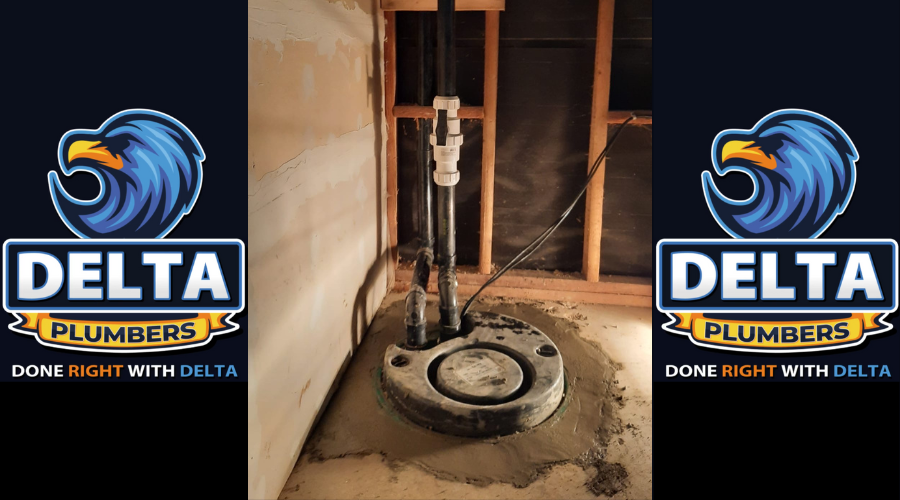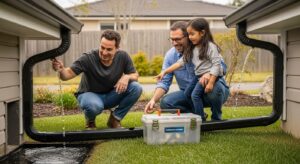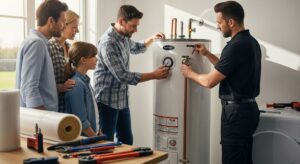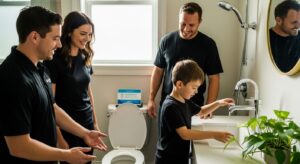Sump pumps play a crucial role in protecting homes from flooding and water damage, especially in areas where heavy rainfall or a high-water table is common. A properly functioning sump pump can prevent costly damage to your basement, foundation, and property by pumping excess water away from your home. However, like any other mechanical system, sump pumps require regular maintenance to ensure they work efficiently when needed most. In this blog, we will explore the importance of proper sump pump maintenance, common reasons for failure, and how often you should service or inspect your pump to avoid issues. Additionally, we will address whether it’s safe to unplug your sump pump overnight.

Picture Source – Delta Plumbers
Why is Sump Pump Maintenance Important?
Sump pump maintenance is critical to ensure that your system works reliably when called upon. If your sump pump fails during a heavy rainstorm or sudden flood event, the results can be devastating. Water could quickly fill your basement, causing thousands of dollars in damage to furniture, appliances, electronics, and even structural elements of your home. Furthermore, standing water can promote mold growth, which poses significant health risks to your family.
Regular maintenance allows homeowners to identify potential issues before they escalate into more serious problems. Sump pumps are designed to handle high volumes of water, but over time, they can become clogged, experience wear and tear, or develop electrical problems. Proper maintenance ensures that the pump runs smoothly and is ready to perform during emergencies. It also prolongs the life of the system, saving you money in the long term by reducing the likelihood of needing to replace the pump prematurely.
At Delta Plumbers, we understand the critical role a sump pump plays in protecting your home from water damage, and we emphasize the importance of regular check-ups to ensure your system remains in peak working condition.
Also Read: Advantages of Using PEX Piping in Plumbing

Picture Source – Delta Plumbers
What is the Most Common Reason for Sump Pump Failure?
One of the most frequent reasons for sump pump failure is a power outage. Since most sump pumps rely on electricity to function, a storm that knocks out power to your home can render your sump pump useless just when you need it most. This is why many homeowners choose to install a backup power source, such as a battery backup or a generator, to ensure their sump pump remains operational during an outage.
Another common reason for failure is clogging. Debris, dirt, and sediment can accumulate in the sump pit or pump mechanism, restricting water flow or preventing the pump from activating properly. Clogged discharge lines can also cause water to back up into the basement. Regular cleaning and inspection of the sump pit and discharge lines can help prevent clogs from forming.
Improper installation is another factor that can lead to failure. If you don’t size the sump pump correctly for your home or install it according to manufacturer specifications, it may struggle to handle the volume of water during heavy rainstorms. This is where professional installation from trusted experts like Delta Plumbers becomes essential to avoid future problems.
Mechanical failure, such as a stuck float switch or a burned-out motor, can also cause the sump pump to fail. The float switch is responsible for activating the pump when water levels rise, and if it becomes stuck, the pump may not turn on. Similarly, a motor that has worn out or overheated will need replacement to restore proper functionality.
Regular maintenance and inspection can catch many of these issues early, preventing sump pump failure and ensuring your basement remains dry.
Also Read: Benefits of Regular Drain Cleaning

Picture Source – Delta Plumbers
How Often Should Pumps Be Serviced?
Just like any other mechanical system, sump pumps need routine servicing to ensure they remain in optimal working condition. At a minimum, your sump pump should be serviced once a year. During this annual service, a professional plumber will check the system for signs of wear and tear, test the pump to ensure it’s working properly, and clear away any debris that may have accumulated in the sump pit.
For homes that are in areas prone to heavy rainfall, flooding, or with a high water table, it may be wise to schedule more frequent servicing. In these cases, you can rely on a sump pump more often, so inspect and maintain it every six months to gain extra peace of mind.
Delta Plumbers recommends homeowners test their sump pump several times throughout the year to ensure it is functioning correctly. You can do this by pouring a bucket of water into the sump pit. If the pump turns on and drains the water, it’s working as expected. If not, it’s time to call in the professionals for a service.
Moreover, if you have a backup pump or battery-powered system, it is equally important to include this in your regular maintenance routine. Backup systems provide protection during power outages and other emergencies, so keeping them in proper working order ensures they are ready to kick in when needed.
Routine servicing not only prepares your sump pump to handle the next heavy rainstorm but also extends the unit’s lifespan, saving you money in the long run.
Also Read: How to Detect and Fix Silent Toilet Leaks

Picture Source – Delta Plumbers
Do Sump Pumps Need to Be Inspected?
Yes, sump pumps need regular inspection to ensure they are functioning properly. Inspections help catch small issues before they become bigger problems and help homeowners avoid costly water damage due to pump failure.
Professional inspections should be done at least once a year. During this time, a plumber will examine the pump, the sump pit, and all associated components. This includes checking the pump’s power source, whether it’s a standard outlet or a backup battery, and testing the float switch and discharge lines. The technician will also clean out the sump pit to ensure there are no blockages or debris that could hinder the pump’s performance.
For a more thorough inspection, Delta Plumbers recommends the following steps:
1. Check the power source –
Ensure the sump pump is plugged into a properly functioning power outlet. If your pump has a battery backup, check that the battery is charged and in good condition.
2. Test the float switch –
The float switch is the mechanism that activates the pump when water rises to a certain level. Pour water into the pit to ensure the float rises and the pump turns on. If the pump doesn’t activate, the float switch might be stuck or malfunctioning.
3. Inspect the discharge line –
The discharge line carries water away from your home. Check for clogs, kinks, or damage to the line. Ensure the line directs water far enough away from the foundation to prevent it from seeping back into the house.
4. Clean the sump pit –
Over time, dirt, gravel, and debris can build up in the sump pit. This can clog the pump or cause it to run less efficiently. Regularly cleaning the sump pit prevents blockages that could lead to pump failure.
Conducting these inspections regularly will keep your sump pump working efficiently and extend its lifespan.
Also Read: Home’s Water Pressure: How to Improve with Delta Plumbers

Picture Source – Delta Plumbers
Can I Unplug My Sump Pump Overnight?
You should not unplug your sump pump overnight. The sump pump protects your home from unexpected water intrusion and must operate 24/7. Even when the weather seems calm or there hasn’t been recent rainfall, groundwater or leaks can still cause water to accumulate in your basement. A sudden rise in the water table or a small plumbing issue could trigger the sump pump without you noticing, and if it’s unplugged, it increases your home’s risk of flooding.
Leaving your sump pump unplugged for even a short time can result in significant water damage, especially if there’s a sudden rainstorm or plumbing issue while you sleep. The best practice is to keep your sump pump plugged in at all times, ensuring it’s ready to activate whenever needed.
If you need to unplug your sump pump temporarily for maintenance or cleaning, make sure to plug it back in immediately afterward. In cases where the pump isn’t functioning correctly, or you’re unsure about its operation, contact professionals like Delta Plumbers to inspect the system and ensure it’s working properly.
A reliable sump pump is your first line of defense against water damage, and keeping it continuously powered and well-maintained is essential for protecting your home.
Conclusion
Proper sump pump maintenance is vital to ensuring your system performs when you need it most. By regularly inspecting and servicing your sump pump, you can catch potential issues early, extend the lifespan of the system, and avoid costly repairs or replacements. Power outages, clogs, improper installation, and mechanical failure commonly cause sump pump failure, but you can prevent these issues with routine care.
At Delta Plumbers, we recommend that homeowners service their sump pumps at least once a year, especially if they live in areas prone to heavy rainfall or flooding. Regular inspections, along with proactive maintenance, will ensure that your sump pump continues to protect your home from water damage.
Remember, never unplug your sump pump overnight, as this can leave your home vulnerable to flooding. Keeping your sump pump operational 24/7 is the best way to avoid unexpected water damage and ensure your home remains dry and safe. By following these guidelines and working with a trusted plumbing professional, you can have peace of mind knowing your sump pump will be ready to tackle any water intrusion.









